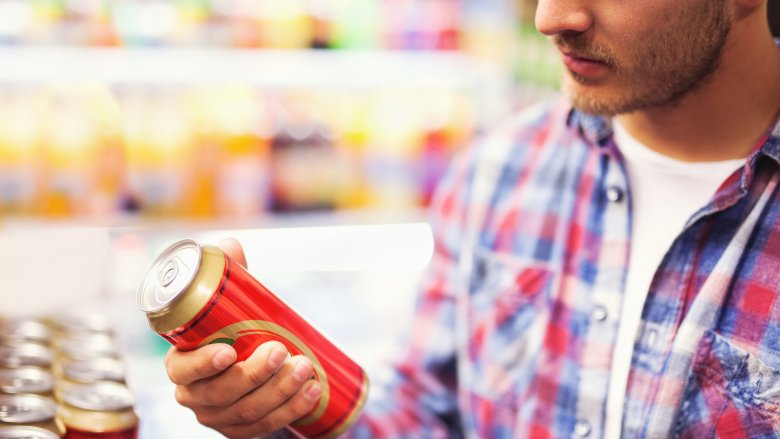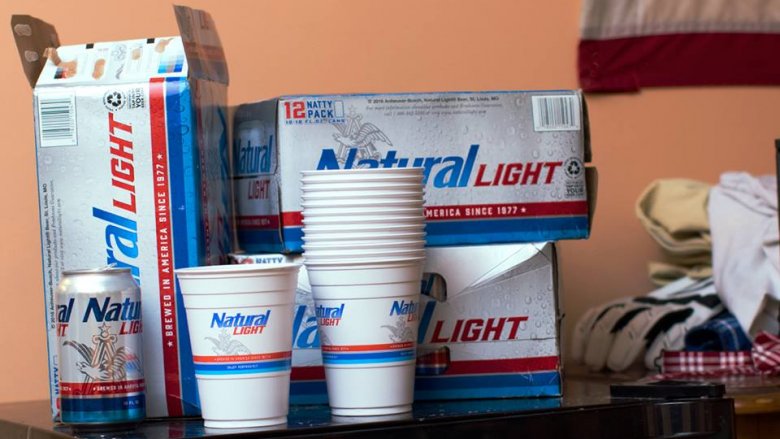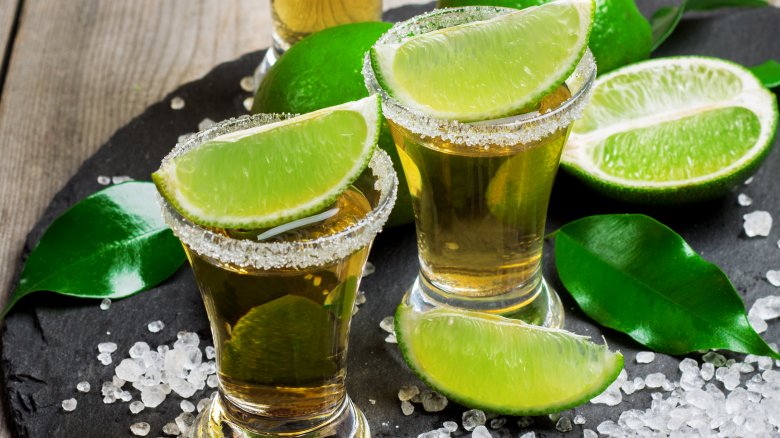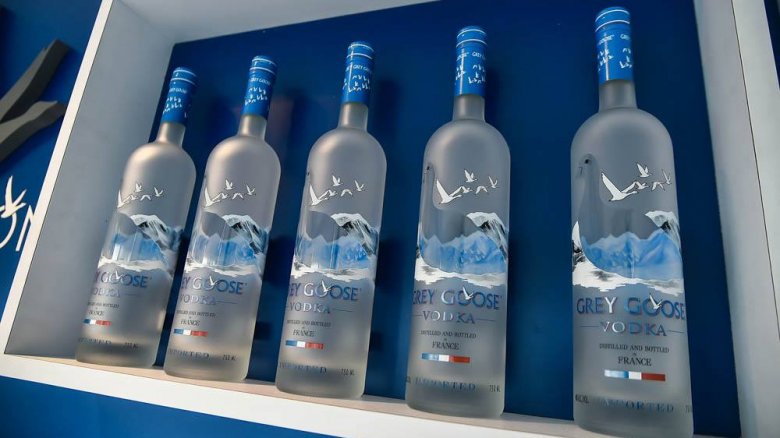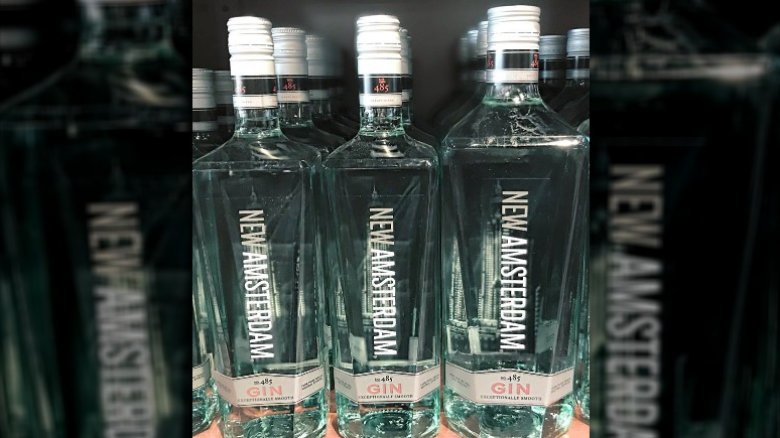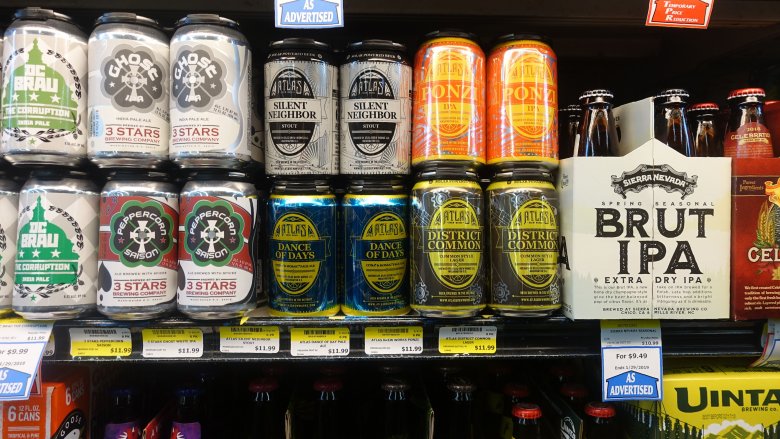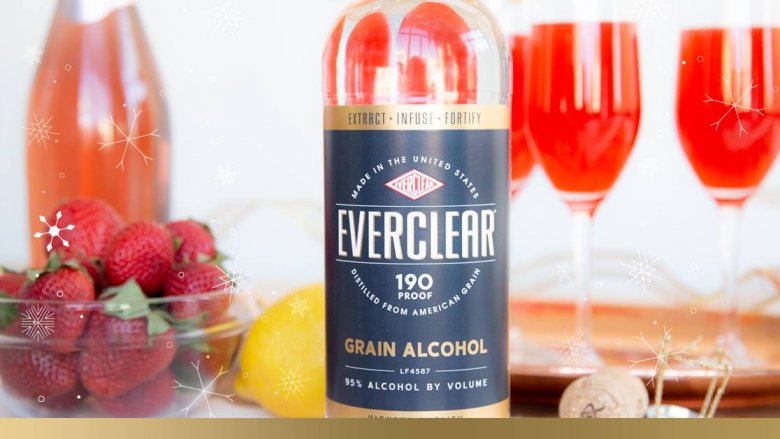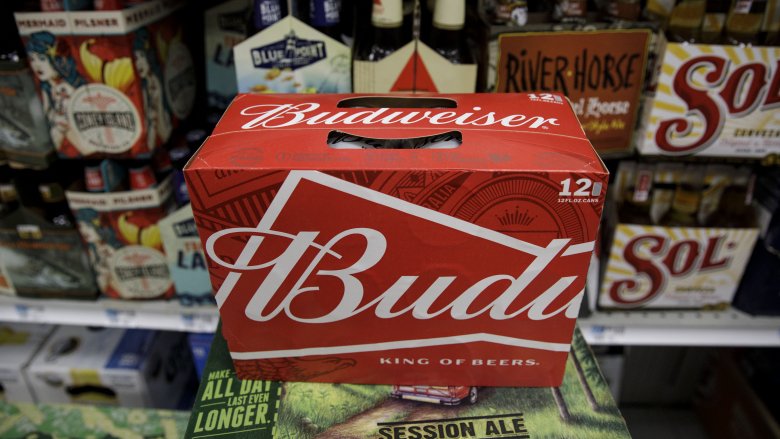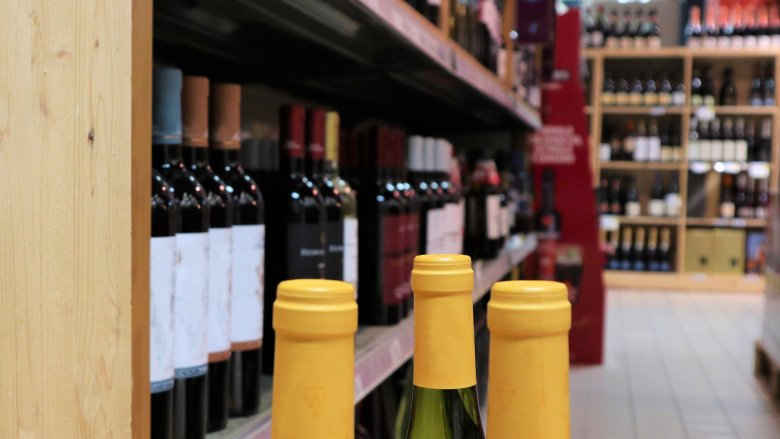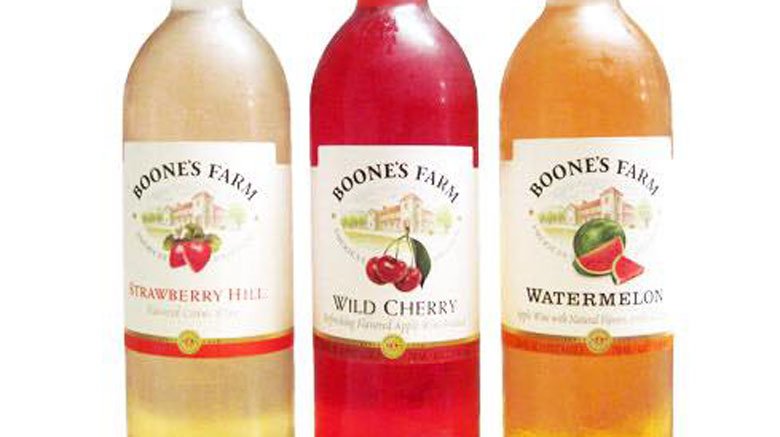Alcohols You Should Never Buy At A Grocery Store
Whether you are throwing a raging party or having a quiet dinner with someone special, you may want to imbibe a few alcoholic beverages. You can purchase your favorite alcohol from liquor stores, big box stores, online retailers, and even from the breweries, distilleries, and wineries directly. But most of the time, it's just easier to pick up a few bottles (or cases) while you're getting groceries.
Grocery stores in some states sell every kind of alcohol possible. Others restrict sales to just beer and wine. Some grocery stores around the country have even added wine bars and beer gardens right in the stores. These grocery store locations reportedly get more traffic since the addition of the bars, but it's unclear whether they also actually get more liquor and grocery sales from their aisles too.
Whatever the laws in your state, here are some alcohols you should never buy from your grocery store.
Don't buy Natural Light at the grocery store
Natural Light, or "Natty Light" as it's called by many people, is often ranked as the worst beer in the world. It absolutely has no business being in your grocery cart under any circumstances. We understand if you are trying to cut calories or save a few bucks, but Natty Light really isn't the answer. This beer has the aroma of corn on the cob left in a musty basement. Worse yet, it tastes like corn water — yes, the water that packs canned corn.
As you might expect, Natural Light has nothing natural about it. But that didn't stop Miller Brewing from launching a complaint with the FTC calling out Anheuser-Busch's Natural Light for misleading packaging. The FTC dismissed the complaint.
To its credit, Natty Light does have a claim to fame. It was the first beer launched into space. Two Natty Light fans built a spacecraft (well, a Styrofoam cooler dubbed the Aluminum Fullcan) complete with a video camera and tracking device. The craft reached an altitude of over 90,000 feet. Not quite outerspace, but close enough.
Stay away from cheap grocery store tequila
Before talking about why you shouldn't drink cheap tequila (you know, like the kind they sell at the grocery store), let's talk about how tequila is made. Tequila is distilled from the juice of the blue agave plant, which by law must be grown in the state of Jalisco, Mexico or in specific municipalities in four other Mexican states. The growing cycle for agave is long with the plants taking at least five years to mature. Harvesting agave is also a difficult process as it's all done by hand. Because of this, making tequila is a long-term investment.
Pure tequila made with 100 percent blue agave has a more distinct, authentic flavor. If a tequila isn't 100 percent agave, then it's a "mixto" tequila. Mixtos are legally allowed to be created with up to 49 percent non-agave sugar and still call themselves tequila. So, your cheap tequila could be mixed with cane sugar, honey or molasses. Mixtos also often add coloring and extracts. Basically, when you drink mixto tequilas, you are mixing different types of alcohol with all kinds of additives and impurities. It's no wonder cheap tequila causes bad hangovers.
When buying tequila, it's worth it to shell out the cash for the good stuff — but you'll have to go beyond your grocery store liquor aisle to find it.
Skip the Grey Goose Vodka from your grocery store
Grey Goose's popularity is a result of good marketing. It was introduced to the American market as a high quality vodka, and many are convinced that it is. However, not much difference exists between Grey Goose and much lower priced brands.
Most mass-produced vodka is extremely distilled. The result is basically ethanol and water, not really much flavor to speak of. If you are mixing your vodka with fruit juice, you can't tell much difference between vodka brands anyway. Even if you drink it straight or on the rocks, the very subtle differences in smoothness don't really justify the Grey Goose price point.
A Vice piece comparing Grey Goose with Costco's Kirkland Signature Vodka indicates both vodkas are created from the same water source, and the much cheaper Costco vodka wins in head-to-head blind taste tests. Try it for yourself and you'll forget all about Grey Goose and its sexy advertising campaigns. Skip this one the next time you're in the grocery store. Instead, head to Costco to find the good stuff.
Don't buy New Amsterdam Straight Gin at the grocery store
Unless you want a gin that doesn't taste anything like gin, you don't want New Amsterdam on your grocery list.
If you are a fan of classic gin, then you probably are not a fan of citrusy gins like New Amsterdam Straight Gin. However, it's not just the citrus notes that kill this gin for us. It's how artificial it tastes. The prominent juniper notes of most gins are missing altogether from New Amsterdam and the dominating orange flavor is very synthetic.
A commenter on The Gin is In wrote, "New Amsterdam tastes like someone dissolved orange-flavored children's aspirin in vodka." Exactly! That's a perfect description of what it tastes like.
New Amsterdam Straight Gin is cheap, and cheap is good for many occasions. However, it's easy to find a better, inexpensive alternative to New Amsterdam Straight Gin. If you are at your grocery store and want to grab a cheap (and good) bottle of gin, pick up Gordon's. It's available almost everywhere and has clean, Juniper-forward, classic gin flavor.
Don't load up on IPAs at the grocery store
When it comes to IPAs, the beer must really be fresh to retain its flavor. Hops are a supporting ingredient in many beers, but IPAs are all about the hops. Light, heat, oxygen, and time can all cause the flavor of hop-heavy beers to diminish rather quickly — which really defeats the purpose.
The faster the IPA gets from the brewery to your mouth, the better. Do you know how long that beer has been on the grocery shelf? "Best by" dates aren't regulated and don't tell you much. Try to decipher the date codes and figure out when it was brewed or bottled, if you can. Typically, IPAs will taste fresh in the first three months after bottling, and there's a chance it has been sitting your grocery store shelf for longer than that. Another problem is many big box grocery chains store beer at room temperature (you've seen those big stacks of beer in the middle of the aisles, right?). This is a big no-no for IPAs. In order for them to stay fresh and flavorful, IPAs need to be kept cold.
A better place to buy IPAs is a smaller liquor store where you can find out when it arrived and how it was stored. Better yet, purchase IPAs directly from breweries when possible. Many cities, big and small, now have their own local breweries — see what your area has to offer!
Walk right on by that Everclear at your local grocery store
Just because your local grocery store sells hard liquor (luck you!) doesn't mean you need the hardest of all liquors. Does a person really ever need something that's nearly 100 percent alcohol? Maybe to use as a cleaning fluid or for violin repair and restoration — but not to drink.
If you've gone to college (or even just been through your early 20s), you've probably heard of Everclear. It's grain alcohol — basically moonshine without that ceramic jug. Many people say they can't taste anything except the burn. Some people say they don't remember much at all after a night with this potent substance.
Everclear is 190-proof — that means 95 percent alcohol. Selling, drinking, or even possessing Everclear is illegal in many states. It probably goes without saying, but the alcohol content in Everclear is so high you get drunk faster than you could possibly imagine. It's basically a recipe for disaster. If you are going to drink, drink responsibly ... and Everclear is so not responsible. Skip this one if you see it at your local grocery store.
Never buy the craft beer your grocery store puts on sale
When your local grocery store has a big sale on mass-marketed beer, such as Budweiser, Coors, and Miller, you know that the beer is moving so fast — so it hasn't been on the shelf that long. However, when a grocery store puts a more unusual IPA or other unique craft beer on sale, you can't be sure why its price has been reduced. Is it because they haven't been able to move it? Should you worry that it's old? If it's a beer which has been intentionally aged, then it's no problem. If it's a dark beer with high alcohol content, then you probably shouldn't worry. But if it's a light lager or hop-heavy IPA, you should be more careful. In this case, unless you are familiar with the brewery's date coding conventions, don't buy it. Old beer (especially kept at room temperature) can be flavorless at best and foul at worst, as we've already learned, and this may be why it's marked down. Don't risk buying beer you'll end up pouring down the drain just to save a few bucks.
Age isn't the only thing that can ruin a good beer. Light is also a big factor in how long a beer can last on the grocery store shelves. For this reason, if you are going to take a risk on a potentially old beer, choose canned over bottled beer because the can keeps out more light. If you hate canned beer, select beer in a dark brown bottle, rather than in a green bottle, or worse yet, a clear bottle.
Don't buy your wine from the grocery store
If you aren't incredibly particular about your brand of wine, you should buy it at Costco rather than your neighborhood grocery store. You'll save a lot of money, and Costco's Kirkland brand is actually pretty good. Some people believe it's excellent.
Believe it or not, an entire website is devoted to reviewing Costco brand wines. The 2017 Kirkland Signature Carneros Pinot Noir and the 2016 Kirkland Signature Columbia Valley Cabernet Sauvignon are popular choices with full-bodied flavors and excellent reviews. With many Costco wines priced at under $10 a bottle, you can fill up your wine rack with Costco wines without breaking the bank.
Don't have a Costco membership? No problem! In many states (Arizona, California, Connecticut, Delaware, Hawaii, Indiana, Massachusetts, Michigan, Minnesota, New York, Texas, and Vermont), it's illegal to require a membership to purchase alcohol. Therefore, you can buy alcohol at Costco without springing for the membership. Armed with that knowledge, there's no reason you should ever purchase wine at the grocery store again.
Skip the Boone's Farm your grocery store still sells
A favorite of the '80s and '90s, Boone's Farm still exists and can be acquired for about $3-4 a bottle. Produced by E & J Gallo Winery, back in the day, this apple wine product was available in a number of fruity flavors. Strawberry Hill was, by far, the most popular variety for a cheap, sweet way to get wasted in your parents' basement or your college dorm.
These days, Boone's Farm can be a little more difficult to find. However, you can still locate it on the bottom shelf of many grocery stores across the country. But just because you can buy it, doesn't mean you should. Though now Boone's Farm is considered malt-based instead of wine-based, with all that fruity sweetness, it still delivers a killer hangover.
Take a step up in sweet sophistication from Boone's Farm and try an apple brandy instead. Laird's Straight Apple Brandy is a good one. The company has been distilling apple brandy for over 200 years. So, they know what they are doing. It's created with eight kinds of apples and all kinds of warm spices. Yum!
The grocery store is not a good choice for buying liquor for a party
Do you need a lot of liquor? Skip the grocery store. Though your grocery store will probably be cheaper than the corner liquor store, you can find a bigger variety and much better prices elsewhere.
If you are buying in bulk for a wedding or other large party, try Costco, Sam's Club, Liquor Barn, or even online retailers for bulk deals. Compare prices and find the best prices on your preferred alcohols. Remember, many guests won't care if you serve top shelf brands or not — and if you're mixing up cocktails, they may not even know.
Sometimes, it takes a bit of math to figure out how much alcohol you need for a big gathering. Fortunately, you can find various liquor calculators online that will do the work for you. For example, Big Red Liquors offers a calculator that considers the number of guests, duration of the party and several other factors to determine how much beer, wine, hard liquor and mixers you need. If you decide to purchase bulk alcohol from a locally owned store (or even a chain where you are friendly with the management), ask for a bulk discount and try to make a deal allowing you to return and get your money back for any unopened bottles you don't use.
Don't buy any grocery store liquor, if you live in these states
As previously mentioned, the laws for buying alcohol vary greatly by state (and sometimes even more so by county or city). Review your local laws before you start searching the grocery store shelves for your favorite bottle.
In some states, it's a free-for-all at the local grocery, and others — not so much. In Delaware, North Dakota, and Rhode Island, you can't buy alcohol in grocery stores at all — not beer, not wine, not any kind of spirits. It's restrictive, but completely straight forward. In Kansas, Oklahoma, and Utah, you can buy beer in grocery stores (no other alcohol), but the beer has to be 3.2 percent ABV (alcohol by volume) or less.
In other states, it gets more tricky. Some have rules about the ABV. Others have rules about the days of the week you can buy alcohol. And still others have more restrictions on holidays. Some states don't even allow alcohol purchases on Election Day. Hmm ... how do you think a reversal of those laws would affect the results?
